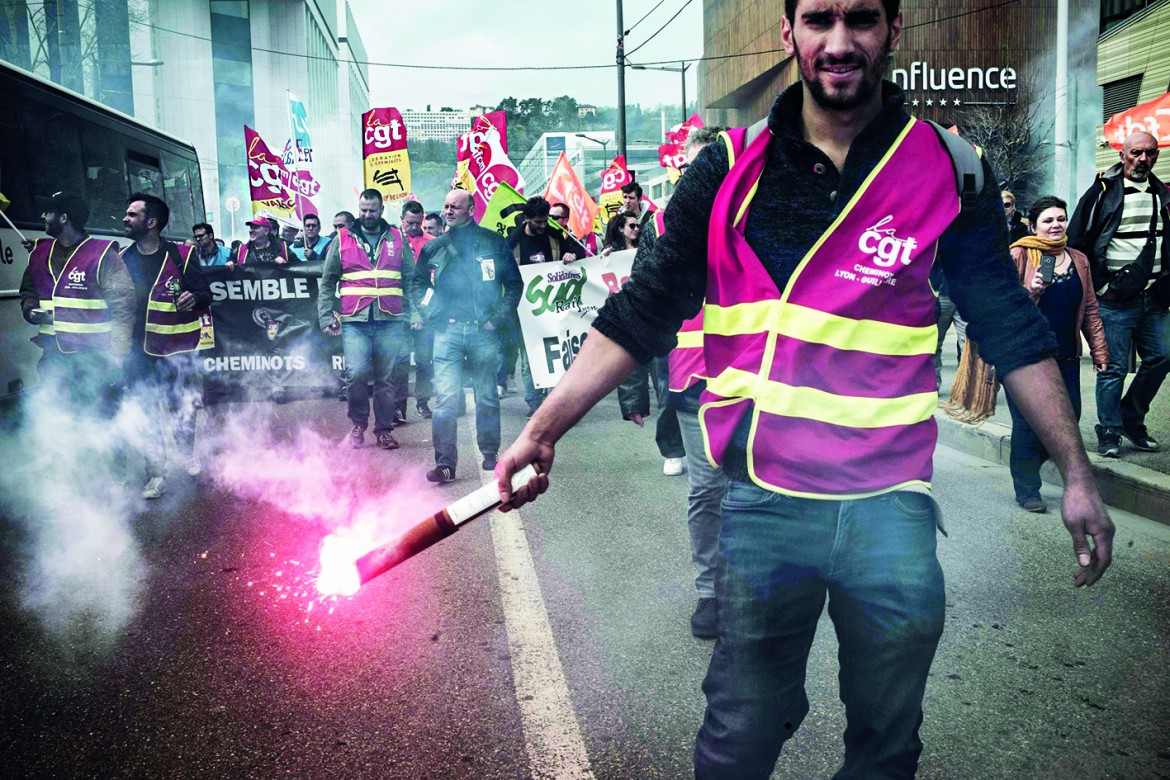Analysis
Macron’s tactic is to divide the unions, but so far it’s not working
A rail workers strike in France brought most of the country to a halt the last two days. Other unions are joining the cause to prevent the first domino from collapsing in the government’s effort to undermine labor protections.

The trains stopped Tuesday in France and again Wednesday. The management of SNCF (French national rail) claimed some 33.9 percent of railway workers went on strike, but the disruption was almost complete: only one high speed service in eight worked Tuesday, and one intercity train in 10.
The rail workers won the first round of the battle. Unions are holding together for now. Rallies took place in many towns. Health workers and pensioners also joined the rallies after demonstrating in the last weeks. Most of all, many students joined the rallies: some 15 universities have stopped completely to protest against Parcoursup, the new enrollment system, suspected of surreptitiously introducing selection procedures. Some incidents took place in Paris because some people, with their faces covered, smashed a few windows and damaged street furniture.
Intellectuals also supported the strike, starting a fundraising campaign that had already raised beyond €100,000 Tuesday.
The list goes on: garbage collection workers, Air France workers (who were on their fourth day of strike), and workers of the energy sector too protested during Macron’s Black Tuesday, starting from Paris.
Prime Minister Edouard Philippe defended the railway reform at the Assemblée: “This reform does not aim to privatize the SNCF, to deprive of a charter those workers who have one, or to shut down smaller services,” but to make sure “SNCF could remain competitive, efficient and provide a quality service tomorrow.”
These are the terms of contention: the government defends the modernization reform so that SNCF can face the future presence of competition — which already exists in many EU member countries. The Left is united behind railway workers, from PCF to the Green Party, NPA, Hamon’s Génération-s — while the PS remains isolated. The Right is an embarrassment: they’re advocating an even harsher reform and oppose Macron, who LR Parliamentary Leader Christian Jacob called “more anxious than reformer.”
France Insoumise accused Transport Minister Elisabeth Borne of serving Brussels’ interests. CGT secretary Philippe Martinez asked the government to “restart [the reform] from a blank slate.” CFDR secretary Laurent Berger said, “The sooner we discuss the reform with the executive, the more likely it is that we can avoid a hard strike — which I do not advocate.” Outgoing FO director Jean-Claude Mailly cautioned that “not much is needed for things to catch fire.”
The government has responded that “negotiations continue” and assured that it is already set to meet with unions on the SNCF reform 10 times this week. But CGT and Sud-Rail object to meetings in which they don’t believe they’ll be heard.
The government has already backtracked on a few proposals: it proposed a relaxed timeline for opening all railway lines to competition (until 2039); railway workers would not lose their charter and will keep the “social backpack” — i.e. all their rights, should they end up working for SNCF competitors; the reform will not be pushed through using ordinances, but will be debated and amended in Parliament. And it would include a tax on lorries to raise funds for improving infrastructure.
Thus, the government aims to divide the unions, convincing ‘reformists’ to start negotiating. But the protest now goes beyond the question of the SNCF. Having seen the government’s tactic, insisting of SNCF workers privileges, railway workers insist that the fight is the last resort to protect a truly “public service”: if we lose, it will pave the way for Macron to do the same to other sectors. “The government will not back down,” says Borne.
Public opinion is the key battleground. So far, 46 percent of France supports the strike (and the share is rising). The protest is prepared to last three months. Will public opinion accuse the government of the negative effects of the strike, or will it side with it? We will understand more during the next round, a strike taking place on April 8 and 9. The government fears the “convergence of battles.” Many worries are growing among pensioners, in hospitals, services and universities.
Originally published at https://ilmanifesto.it/primo-round-ai-ferrovieri/ on 2018-04-04
